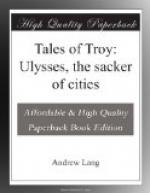Now the Trojans had rest from war for a while, and Priam, with a heavy heart, bade men take his chief treasure, the great golden vine, with leaves and clusters of gold, and carry it to the mother of Eurypylus, the king of the people who dwell where the wide marshlands of the river Cayster clang with the cries of the cranes and herons and wild swans. For the mother of Eurypylus had sworn that never would she let her son go to the war unless Priam sent her the vine of gold, a gift of the gods to an ancient King of Troy.
With a heavy heart, then, Priam sent the golden vine, but Eurypylus was glad when he saw it, and bade all his men arm, and harness the horses to the chariots, and glad were the Trojans when the long line of the new army wound along the road and into the town. Then Paris welcomed Eurypylus who was his nephew, son of his sister Astyoche, a daughter of Priam; but the grandfather of Eurypylus was the famous Heracles, the strongest man who ever lived on earth. So Paris brought Eurypylus to his house, where Helen sat working at her embroideries with her four bower maidens, and Eurypylus marvelled when he saw her, she was so beautiful. But the Khita, the people of Eurypylus, feasted in the open air among the Trojans, by the light of great fires burning, and to the music of pipes and flutes. The Greeks saw the fires, and heard the merry music, and they watched all night lest the Trojans should attack the ships before the dawn. But in the dawn Eurypylus rose from sleep and put on his armour, and hung from his neck by the belt the great shield on which were fashioned, in gold of many colours and in silver, the Twelve Adventures of Heracles, his grandfather; strange deeds that he did, fighting with monsters and giants and with the Hound of Hades, who guards the dwellings of the dead. Then Eurypylus led on his whole army, and with the brothers of Hector he charged against the Greeks, who were led by Agamemnon.
In that battle Eurypylus first smote Nireus, who was the most beautiful of the Greeks now that Achilles had fallen. There lay Nireus, like an apple tree, all covered with blossoms red and white, that the wind has overthrown in a rich man’s orchard. Then Eurypylus would have stripped off his armour, but Machaon rushed in, Machaon who had been wounded and taken to the tent of Nestor, on the day of the Valour of Hector, when he brought fire against the ships. Machaon drove his spear through the left shoulder of Eurypylus, but Eurypylus struck at his shoulder with his sword, and the blood flowed; nevertheless, Machaon stooped, and grasped a great stone, and sent it against the helmet of Eurypylus. He was shaken, but he did not fall, he drove his spear through breastplate and breast of Machaon, who fell and died. With his last breath he said, “Thou, too, shalt fall,” but Eurypylus made answer, “So let it be! Men cannot live for ever, and such is the fortune of war.”




